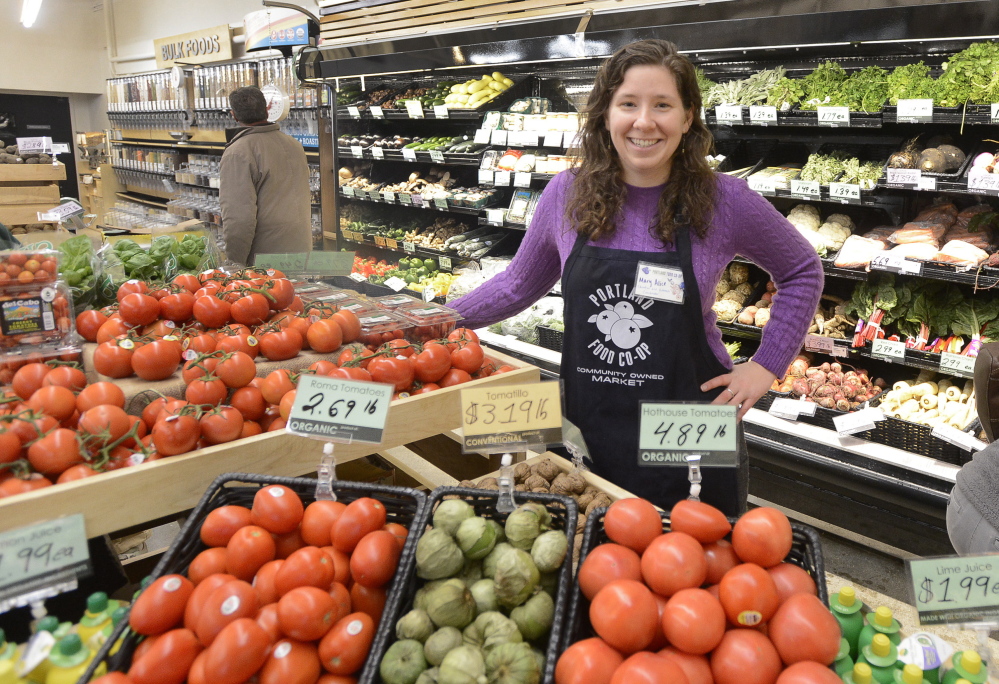The Portland Food Co-op held its grand opening Wednesday, marking the transformation of the organization from an entirely volunteer-run food co-op, where members volunteered and picked up food at a warehouse, into a retail operation. Mary Alice Scott, the co-op’s education and outreach coordinator, said the store at 290 Congress St. now employs 20 people.
Q: How did you get involved with the co-op?
A: When I lived in Lancaster County (Pennsylvania), I got very interested in local foods and when I moved up to Portland four years ago, I came with an appreciation for farmers. I started volunteering with Cultivating Community (a local group which uses agriculture as a community and youth development tool) and their food corps program. I’ve always been fairly politically active, so the combination made the food co-op a natural fit for me. When the job arose, I jumped at the chance.
Q: What is the Portland Food Co-op?
A: It’s a community-owned grocery store. Anybody who wants to can be an owner and get a vote and help shape the structure of the organization, along with access to special deals and sales. For instance, today (Wednesday) all members get 10 percent off their first purchase. And, we’re here to serve the community and not just sell food.
Q: How much does it cost to become a member?
A: It’s $100, one time.
Q: Why join a co-op instead of going to a mainstream grocery store?
A: It’s a mission-driven idea. People want to support businesses that are locally owned and know they’re generating jobs. Our mission is to have a huge amount of organic and local products and buy from local vendors whenever practical. It’s not just fruit and vegetables, it’s local cleaning supplies and other local items. We already have relationships with more than 120 local producers.
Q: The co-op was once an all-volunteer program. Was it hard to switch to being primarily staff-driven?
A: It was an enormous volunteer effort, and the strength of our member-owners has shown how well we were able to carry that. Our board was very active to keep those operations going. It was a good way for us to build community support to get the retail operation going.
Q: What drove the decision to open the store?
A: The plan was always to do a retail operation, which usually takes five years. It’s a matter of getting the right people together. It was about a year and a half ago that the board started looking into a viability study. We got in some national consultants and local groups to put together a business plan.
Q: The store actually opened its doors three weeks ago. Why go with a soft opening?
A: That’s one of the best practices we found in looking at how other co-ops developed retail stores. Normally, when a grocery store opens, it takes about two years to really get going; we gave ourselves three weeks. We are continuously seeking feedback and want to make sure were serving the needs of the community.
Q: How is the co-op different from a conventional grocer?
A: When you walk in, you still see a grocery store, with fresh produce. Our produce manager has worked incredibly hard and we have 99 percent organic produce and more than 50 products from local farmers – and it’s mid-December, so I think that’s awesome. The staff is also excited to engage with customers. We put up a map showing all our local producers.
We have worked with local designers and architects to beautify the store and we have our mission statement on a beautiful piece of art by the checkout: “The Portland food co-op beings local producers and consumers together in a member-owned marketplace to grow a healthier community. We model cooperative values, operate with transparency and foster trusting relationships with our customers, employees and suppliers.”
We still have volunteers but we have kind of shifted from all volunteer to all-staff now. We’ve created 20 local jobs in the community.
Q: Do you still work with other community organizations?
A: For the past few years, we’ve had the opportunity to purchase food and donate it to Preble Street. Something like 50 or 60 percent were local items, like eggs, butter and beans. We will continue doing that and we will also be working with organizations like Cultivating Community and holding volunteer days at local farms.
Q: Where do you see the co-op in a few years? Are more retail operations possible?
A: At the very minimum, in three to four years we want to have hundreds of Maine products and regional products. We are working hard to develop those relationships and we want to further our mission to work to improve the local food economy, whether it’s purchasing more from local vendors, or out in the community.
Send questions/comments to the editors.




Success. Please wait for the page to reload. If the page does not reload within 5 seconds, please refresh the page.
Enter your email and password to access comments.
Hi, to comment on stories you must . This profile is in addition to your subscription and website login.
Already have a commenting profile? .
Invalid username/password.
Please check your email to confirm and complete your registration.
Only subscribers are eligible to post comments. Please subscribe or login first for digital access. Here’s why.
Use the form below to reset your password. When you've submitted your account email, we will send an email with a reset code.